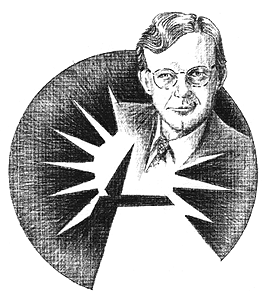



By Alan Earles
"Once I'd been at WPI for a short time I realized I didn't want to be a narrowly focused technologist," says Steven W. Harvey. Fortunately, the flexibility of the Plan and its emphasis on individual choice -- the reasons Harvey chose WPI -- let him chart his own course.

While doing paid and volunteer work with inner city youth as a teenager, Harvey became interested in city planning. Working within the urban planning program in WPI's Civil Engineering Department, he developed his own major in humanities and technology. For his Interactive Qualifying Project, he completed an internship at the Central Transportation Planning Staff, an arm of Greater Boston's Metropolitan Area Planning Council.
"That experience focused my interest on the process by which cities operate," he says. It also showed him another element of the reality of reshaping a city: "Underneath it all there was often a complicated financial issue," he says. "That was brand new to me."
After graduation, Harvey took "an immediate left turn, landing a job at Rounder Records in Cambridge, Mass. At the recording industry start-up, he found ways to apply his WPI education. As a small, closely held company, Rounder was up against stiff competition. At the time, its distribution arm was helping to support the fledgling recording operations, but its geographic reach was limited. "It was purely domestic when I started," he says. "As distribution manager, I built international distribution, picked up some record labels, and increased sales."
But the positive experiences he'd had with the Plan kept tugging at him, so in 1979 he moved back to the public sector, taking a job as a program manager with the Massachusetts Medicaid Program. "If I was going to make a career in government," he says, "I knew I would need training, but first I wanted to find out if it was really right for me." In short order, he was implementing one of the first managed-care programs in the nation for low-income families and setting up two demonstration projects based in neighborhood health centers.
"I saw -- even more clearly -- how crucial the financial side is in any public project," he says. It also became clear how few individuals in the public sector were equipped to understand and manage complex financial issues. Harvey decided to become one of them, enrolling in an M.B.A. program at the Wharton School of the University of Pennsylvania.
While there, he had the opportunity to consult for Philadelphia's director of finance. "I helped put together bond issues and bond deals -- my first exposure to the municipal bond market," he says. The experience was an eye-opener -- here was a challenging area, poorly understood by many in government, yet crucial to both day-to-day operations and long-term programs.
In 1983, Harvey joined Standard & Poor's Corp. as a municipal ratings officer. Three years later he moved over to the investment side of municipal finance when he joined Fidelity Investments, a mutual funds giant with extensive involvement in municipal instruments. For six years, he honed his skills, leading the research effort on all the tax-exempt health care bonds in Fidelity's funds. He also structured $95 million in directly placed health care securities and restructured a $12 million hospital bond holding and a $31 million hotel financing.
In 1993, he graduated to portfolio manager at Fidelity. Today he manages five municipal bond portfolios totaling $1.9 billion, including the $1.1 billion Massachusetts Tax-Free Bond Fund. Like other fund managers, he is captain of his own ship on a sea that can often turn rough. Keeping his eye on the pulse of global financial markets and on the grassroots political forces that can upend funding programs, he must devise investment strategies and supervise active trading tactics within his portfolio. He notes with pride that his funds have bested 80 percent of his competitors' during his tenure.
His funds hold bonds that finance some of the country's largest construction projects, including the cleanup of Boston harbor and that city's "Big Dig." Harvey says, "Having an understanding of the engineering complexity of these mammoth projects helps me identify the best investment ideas."
But the real edge he gained from his WPI education comes from "having a technical background combined with a humanistic perspective." As a portfolio manager, Harvey must design and present marketing campaigns for brokers and retail clients. He is also called upon often to address a wide variety of groups involved in the bond market. "The attention I received at WPI from the humanities faculty sharpened my writing and communication skills tremendously. It has served me well throughout my career."
The thinking skills he gained as a WPI student also inform Harvey's day-to-day activities. He says the Plan gave him a tool-kit for tackling virtually every challenge he has faced in the working world. "I have the ability to quickly break down every problem I face into its component parts," he says.
And as if that were not enough to make him think often of his alma mater, his current job provides him with a daily reminder of the Plan. "When I look out my office window, I can see the building where I did most of my IQP work."